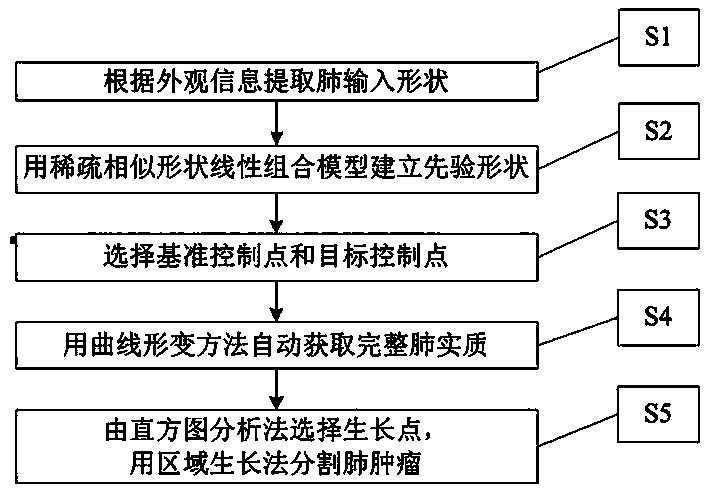Lung tumor segmentation method for large-area adhesion of lung boundary tissue in CT image
A CT image, large-area technology, applied in the field of lung tumor segmentation, can solve the problem of poor segmentation accuracy of large adhesion-type lung tumors
- Summary
- Abstract
- Description
- Claims
- Application Information
AI Technical Summary
Problems solved by technology
Method used
Image
Examples
Embodiment Construction
[0051] The specific implementation process of the present invention adopts the following computer software and hardware conditions to realize, but is not limited to the following conditions: Lenovo desktop computer, CPU is Pentium Dual-Core CPU E5800@3.20GHz, graphics card is NVIDIA GeForce GT 430GPU, memory 4GB, operation The system is Window 7, and the software programming language uses Matlab 2009.
[0052] The basic process of the lung tumor segmentation method with large-area adhesion of lung border tissue in CT images of the present invention is as follows: figure 1 As shown in the figure, first, according to the image appearance information, the lung parenchyma with large continuity error is segmented by Otsu threshold and morphological opening and closing operation method, and this is used as the input shape. Shape priors are then constructed using a sparse similar shape linear combination model. Then select the deformation curve and its control points on the prior sh...
PUM
 Login to View More
Login to View More Abstract
Description
Claims
Application Information
 Login to View More
Login to View More - R&D
- Intellectual Property
- Life Sciences
- Materials
- Tech Scout
- Unparalleled Data Quality
- Higher Quality Content
- 60% Fewer Hallucinations
Browse by: Latest US Patents, China's latest patents, Technical Efficacy Thesaurus, Application Domain, Technology Topic, Popular Technical Reports.
© 2025 PatSnap. All rights reserved.Legal|Privacy policy|Modern Slavery Act Transparency Statement|Sitemap|About US| Contact US: help@patsnap.com



